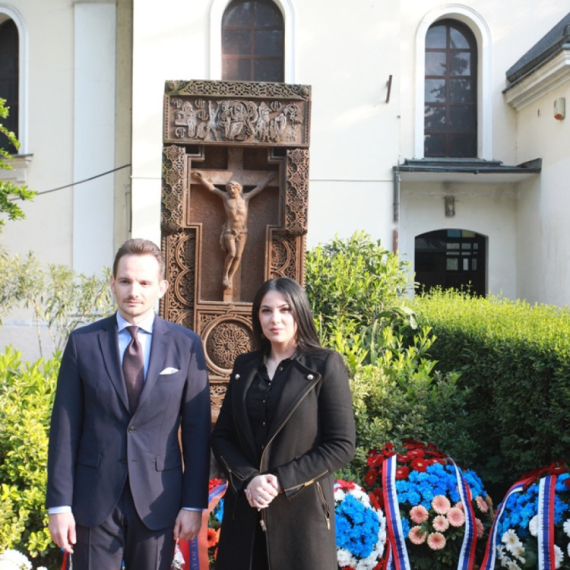Assembly passes set of new media laws
Thursday, 07.08.2014.
22:51

Assembly passes set of new media laws
The Public Information and Media Law envisages privatizations of the media to be complete by July 2015.As explained, the act creates the conditions for free development of independent, professional media and a media system that should provide for the broadest needs of citizens, without discrimination, for information and content from all areas of social life.
Prescribed is also the withdrawal of the state from media ownership, except in specifically defined cases, as well as clearly defined public interest in the area of public information.
The law regulates the position of the editor, protection of journalists' rights and encourages journalistic association, transparency of media ownership, establishment of a register of media and protection of media pluralism by preventing unauthorized merges in the area of public information.
It is designed to move from direct budget financing of some media to a system of project, competition co-financing for all media in the register, legal entities or entrepreneurs who have registered to produce media content, as well as other legal entities or entrepreneurs.
Project co-financing is open for independent productions, civic associations and other entities that are not the founders of the media.
From the budgets of state, provincial and local governments funds will be provided for public information and these funds will be distributed through public competitions and individual allocations, based on the principle of the non-discrimination rule on allocation of state aid and competition protection.
Funds intended for individual allocations are limited to five percent of the total funds for achieving the public interest in the field of public information through public tenders.
The amount of individual giving cannot be more than 20 percent of the amount that is prescribed for public procurements of low value.
The ministry in charge of public information makes bylaws which will specify the manner, conditions and criteria for assigning funds through co-financing and prescribe the necessary forms.
The law specifies that the term public medium has been abandoned, and medium adopted such as daily and periodical newspapers, news agencies, radio programs and television programs and their electronic editions, independent electronic publications, which implies editorially arranged websites or internet portals, which are registered in the registry of the media.
A medium is not a legal entity. The law determines also what a medium is not - books, films, carriers of audio and audio-visual content, scientific and professional journals, internet search engines and aggregators - by this preventing various interpretations of what a medium is.
Any physical or legal person can be a publisher. They must be registered with competent authorities of the Republic to conduct business, while a medium can be established by any domestic or foreign physical or legal person, in accordance with the law.
Any change of the publisher is entered into the register of media.
The law defines impressums, establishes the register maintained by the Agency for Business Registers, offers legal protection to journalists related to labor rights, according to the regulations in the field of the labor law, reinforcing the basis for protection of professional journalistic integrity from abuse and harassment aimed at preventing freedom of information.
Protected is also the right of journalists to publish statements and express views and opinions, the right to express their views or opinions outside of the public media as personal opinion, the right to refuse an instruction which would violate legal rules and ethics of journalism, as well as the right to authenticate reports, which means that an article whose meaning was altered in the editorial process must not be published under the name of the journalist without their consent.
The law also contains a provision on journalistic secret that guarantees a journalist does not have to disclose information relating to the source of information, unless the information relates to a criminal offense or offender for which the law envisages punishment of at least five years in prison, and if the data cannot be acquired by other means.
The freedom of establishment of journalists' associations is also guaranteed and the position of representatives of foreign media and bureaus is regulated. The law states that they have the same rights and obligations as local editors, reporters, and other associates.
The law regulates specific issues related to public information and to presumption of innocence, disclosure of information in connection with criminal proceedings, prohibition of hate speech, protection of minors and a ban on public displays of pornography.
This legal solution also regulates protection of the dignity of persons to whom the information relates and it is not allowed to publish information that violates honor or prestige, presents a person in a false light, if the interest of publishing the information is not outweighed by the interest of protecting the dignity and the right to authenticity.
The law for the first time provides protection to victims of violence, regulates disclosure of private facts and personal records, and rules relating conditions under which it is permitted to disclose private life information and personal written records.
An important novelty is envisaged in the provision that specifies when consent is not required for disclosure of information related to private life, if in the specific case the public interest to obtain information or records outweighs the interest of preventing its disclosure. These cases are precisely envisaged by the law.
When it comes to publishing corrections, it is a mechanism for elimination of consequences of publication of false, incomplete or inaccurate information, suffered by a person whose rights or legal interests were harmed by publishing the information.
While on the one hand, the response represents a legal mechanism that guarantees the right of a person who is affected by the publication of information to publicly present their factual claims, the right to correction guarantees that the individual may request from a court to determine that the information is false, incomplete or incorrectly reported.
This person may request that the court orders the responsible editor to publish free of charge a correction of the information as inaccurate, incomplete or incorrectly reported.
The law also set aside funds for 2014 in the amount of RSD 268,125,000 for public enterprises Tanjug, Panorama, and Radio Yugoslavia.
By the end of the year it is necessary to provide additional funds in the amount of RSD 89,375,000, while the first half of next year RSD 178,750,000 should be provided from the budget.
The law also regulates the manner of exercising freedom of the media, especially the gathering, publishing and receiving of information, freedom of expression and attitudes and opinions, printing and distribution of newspapers and freedom of production, supply and transmission of audio and audio-visual media services.
The legal solutions include freedom to disseminate information through the internet and other platforms, as well as freedom to publish media and perform activities of public information in a way that covers all individually specified aspects of freedom of public information - starting with freedom of creation and distribution of media content, all the way to providing conditions for free publishing of public media.
Specified are also the principles on which freedom of public information is based, and they are guaranteed freedom of public information and prohibition of censorship, discrimination of journalists, coercing, threatening or blackmailing of editors, journalists and sources of information.
The second principle is the realization of rights of the public to be informed on matters of public interest, and the principle of protection of media pluralism and the prohibition of monopolies in the media.
Stated is also the principle that regards facilitating the public access to data on the media in order to form own opinions about the credibility and reliability of information, views and opinions published in the media, and in order to assess the possible impact of the media on public opinion and protect media pluralism.
The fifth principle speaks about the position of holders of public or political offices, to ensure smooth communication between citizens and politicians, as well as those holding state offices, who are legally obligated to suffer critical opinions concerning the results of their work and policies they conduct.
The legal solutions provide for due journalistic diligence relating to editors and journalists.
This concerns special obligations of editors and journalists in the process of reporting information, views and opinions to do so accurately and thoroughly, and the duty to state the name of another media outlet from which the published information originates.
Public service media have an obligation to report about phenomena, events and persons promptly and impartially, to allow the expression of views and opinions that are represented in the community, in the spirit of tolerance, encourage discussion on all subjects of public interest, produce various programs and seek the highest level of service quality.
The public interest in the field of public information has also been determined, which represents the realization of the rights of the public to be informed, and is achieved through the media.
Free development of independent, professional media and a media system should provide for the broadest needs of citizens, without discrimination, for information and content from all walks of life - politics, economy, culture, arts, education, environment, sports, and entertainment.
The Law on Electronic Media was also adopted in parliament, defining the jurisdiction of the Serbia state over audio-visual media service providers due to the transition to digital broadcasting.
New technical advances mean that all member states of the EU must by 2015 switch from analogue to digital broadcasting, and in that area providers of media content are considered as providers of audio-visual media services and not as a broadcasters.
The law terminologically harmonizes and determines the definition of terms in accordance with the Directive on Audiovisual Media Services, normative regulation of labor, responsibilities and activities of the regulatory body in the field electronic media, given the changed circumstances that will occur by switching from analogue to digital broadcasting.
The law defines guaranteed freedom of reception and retransmission of media services, in order to define and determining the type of audio-visual media services in accordance with EU directives.
The audiovisual policy is one of the more important policies of the European Union and in March 2010 the EU with the AVMS Directive established a new regulatory framework in relation to provision of audiovisual media services.
Serbia is a candidate for EU membership and this directive in the further process of accession to full membership of the EU has imposed the need to harmonize the current legislation with the standards set therein.
The new law on public media services regulates operations of public media services RTS and RTV, specifying obligations of their work on principles of truthful, unbiased, complete and timely information, prohibition of censorship, respect of human rights, and their financing from the budget by 2016.
The law specifies that starting in 2016 their funding will come from the tax for public service media, from the budget, an from commercial revenues.
Also, the law stresses the respect for professional standards and codes in the public interest, which includes production, purchase, processing and publication of radio, television and multimedia content, especially informational, educational, cultural, artistic, children's programs, entertainment, sports, religious, and others in the public interest of citizens.
The law emphasizes that public media services provide for the public interest, upholding the demands of the public and are responsible to the same public for their actions, while the responsibility of the public media services is realized through the public appointing of bodies of public media services.
The content broadcast by RTS and RTV must have the goal of achieving human rights and freedoms, exchange of ideas and opinions, cherishing the values of a democratic society, promotion of political, sexual, ethnic and religious tolerance and understanding, and preservation of the national identity of the Serb people and ethnic minorities.
The enumerated duties include respect and promotion of pluralism of political, religious and other ideas and allowing the public to be aware of these ideas, not serving the interests of individual political parties and religious communities, nor any other single political, economic, or religious interest.
Preservation and expression of the cultural identity of the Serb people and of ethnic minorities has also been specified, while it is an obligation to secure specific programming units in the language and script of minorities.
The tax from which the two public media services will be financed will be introduced in 2016 and cannot exceed RSD 500.
The tax amount in the coming years will be aligned with the growth of the Consumer Price Index for the month of September in the year in which it is adjusted.
The fee will be paid by all citizens and legal entities that have a power meter.
The law details which individuals and legal entities are exempt, and takes into account the disabled and socially disadvantaged individuals and households.
The law also provides for budget funds for the public media services' basic activities, and precisely states when these funds can be approved. The decision on the allocation is made by the government.
RTS and RTV are required to annually submit to the Assembly of Serbia and the regulatory body for electronic media their reports on activities during the previous year, along with reports of an independent auditor.






































Komentari 0